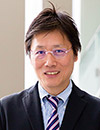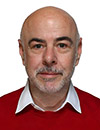Plenary Event
Organic Photonics + Electronics Plenary
4 August 2025 • 10:30 AM - 12:20 PM PDT | Conv. Ctr. Room 6A
10:30 AM – 10:35 AM: Welcome and Opening Remarks
Zakya H. Kafafi, Lehigh Univ. (United States); Ifor D. W. Samuel, Univ. of St. Andrews (United Kingdom); Thuc-Quyen Nguyen, Univ. of California, Santa Barbara (United States)
10:35 AM – 11:05 AM:
Precise control of CT states pioneering advanced organic devices
In organic optoelectronic devices, high performance has been achieved through precise molecular design based on various electron-donating and electron-accepting units, which control electrical conduction, exciton generation, charge separation processes, and even spontaneous dipole orientation in thin films. From the aspect of charge transfer phenomena, we will mention the improvement of the efficiency and durability of organic devices, clarify the correlation between individual molecular design and macroscopic device characteristics, and provide an overview of the future development of organic devices.
Prof. Adachi obtained his Ph.D. from Kyushu University, Japan. After he had research experiences at company/universities, he returned to Kyushu University as a professor in 2005 and appointed the director of Center for Organic Photonics and Electronics Research (OPERA) since 2010. He has been selected as a highly cited researcher (Clarivate) since 2018.
11:05 AM - 11:10 AM: Q&A with Chihaya Adachi
11:10 AM – 11:40 AM:
Organic electronics in optical (bio)chemical sensing
Promising applications of organic electronics (OE), which include (bio)chemical sensing and biomedical diagnostics have been on the rise. Resulting devices are compact, low-cost, and efficient. They can be fabricated on glass or flexible plastics. Wearable designs are possible. A review will be presented on the utilization of (microcavity) OLEDs, tunable (wide and narrow band) organic and fast-responding hybrid perovskite-based photodetectors, and their combinations in all-organic, photoluminescence (PL)-based sensing platforms for efficient, simultaneous detection of multiple analytes. Analyte detection is based on monitoring dose-dependent changes in the PL intensity or decay time (a preferred approach) of analyte-sensitive dyes. Related applications and the integration of such OE tools with microfluidic channels for compact lab-on-a-chip designs, addressing the need for sensor miniaturization, will also be discussed.
Ruth Shinar retired recently from Iowa State University, where she was a Senior Scientist at the Microelectronics Research Center and an Adjunct Professor of Electrical and Computer Engineering. Her contributions to organic electronics include well-recognized research on optical (bio)chemical sensing utilizing integrated designs of OLEDs and organic or hybrid photodetectors.
11:40 AM - 11:45 AM: Q&A with Ruth Shinar
11:45 AM – 12:15 PM:
Printing electronic and optoelectronic devices: from combinatorial materials development to smart system integration
Inkjet printing (IJP) is well-established as a versatile and cost-effective prototyping and fabrication method for flexible electronic and optoelectronic devices. Building on this foundation, IJP is now advancing beyond a conventional deposition method to enable accelerated combinatorial materials development. This innovative approach allows for the simultaneous optimization of material properties and device architectures during printing. In particular, with metal halide perovskites, the tunable bandgap facilitates the creation of tailored compositions for applications such as multi-color light-emitting diodes and combinatorially optimized photodetectors. By bridging materials development with scalable manufacturing, IJP is poised to drive next-generation device innovation and smart system integration.
Emil List-Kratochvil is a Professor for Hybrid Devices at Humboldt-Universität zu Berlin and Helmholtz-Zentrum Berlin. He earned his PhD in Solid-State Physics from Graz University of Technology. His research focuses on hybrid semiconductors, additive deposition techniques, and combinatorial synthesis, bridging fundamental research and practical applications in advanced materials and devices.
12:15 PM – 12:20 PM: Q&A with Emil J.W. List-Kratochvil
MENU: Coffee, decaf, and tea will be available outside the presentation room.
SETUP: Theater style seating.
Zakya H. Kafafi, Lehigh Univ. (United States); Ifor D. W. Samuel, Univ. of St. Andrews (United Kingdom); Thuc-Quyen Nguyen, Univ. of California, Santa Barbara (United States)
10:35 AM – 11:05 AM:
Precise control of CT states pioneering advanced organic devices
 |
Chihaya Adachi
Kyushu Univ. (Japan) |
In organic optoelectronic devices, high performance has been achieved through precise molecular design based on various electron-donating and electron-accepting units, which control electrical conduction, exciton generation, charge separation processes, and even spontaneous dipole orientation in thin films. From the aspect of charge transfer phenomena, we will mention the improvement of the efficiency and durability of organic devices, clarify the correlation between individual molecular design and macroscopic device characteristics, and provide an overview of the future development of organic devices.
Prof. Adachi obtained his Ph.D. from Kyushu University, Japan. After he had research experiences at company/universities, he returned to Kyushu University as a professor in 2005 and appointed the director of Center for Organic Photonics and Electronics Research (OPERA) since 2010. He has been selected as a highly cited researcher (Clarivate) since 2018.
11:05 AM - 11:10 AM: Q&A with Chihaya Adachi
11:10 AM – 11:40 AM:
Organic electronics in optical (bio)chemical sensing
 |
Ruth Shinar
Iowa State Univ. of Science and Technology (United States) |
Promising applications of organic electronics (OE), which include (bio)chemical sensing and biomedical diagnostics have been on the rise. Resulting devices are compact, low-cost, and efficient. They can be fabricated on glass or flexible plastics. Wearable designs are possible. A review will be presented on the utilization of (microcavity) OLEDs, tunable (wide and narrow band) organic and fast-responding hybrid perovskite-based photodetectors, and their combinations in all-organic, photoluminescence (PL)-based sensing platforms for efficient, simultaneous detection of multiple analytes. Analyte detection is based on monitoring dose-dependent changes in the PL intensity or decay time (a preferred approach) of analyte-sensitive dyes. Related applications and the integration of such OE tools with microfluidic channels for compact lab-on-a-chip designs, addressing the need for sensor miniaturization, will also be discussed.
Ruth Shinar retired recently from Iowa State University, where she was a Senior Scientist at the Microelectronics Research Center and an Adjunct Professor of Electrical and Computer Engineering. Her contributions to organic electronics include well-recognized research on optical (bio)chemical sensing utilizing integrated designs of OLEDs and organic or hybrid photodetectors.
11:40 AM - 11:45 AM: Q&A with Ruth Shinar
11:45 AM – 12:15 PM:
Printing electronic and optoelectronic devices: from combinatorial materials development to smart system integration
 |
Emil J.W. List-Kratochvil
Humboldt-Univ. zu Berlin (Germany) |
Inkjet printing (IJP) is well-established as a versatile and cost-effective prototyping and fabrication method for flexible electronic and optoelectronic devices. Building on this foundation, IJP is now advancing beyond a conventional deposition method to enable accelerated combinatorial materials development. This innovative approach allows for the simultaneous optimization of material properties and device architectures during printing. In particular, with metal halide perovskites, the tunable bandgap facilitates the creation of tailored compositions for applications such as multi-color light-emitting diodes and combinatorially optimized photodetectors. By bridging materials development with scalable manufacturing, IJP is poised to drive next-generation device innovation and smart system integration.
Emil List-Kratochvil is a Professor for Hybrid Devices at Humboldt-Universität zu Berlin and Helmholtz-Zentrum Berlin. He earned his PhD in Solid-State Physics from Graz University of Technology. His research focuses on hybrid semiconductors, additive deposition techniques, and combinatorial synthesis, bridging fundamental research and practical applications in advanced materials and devices.
12:15 PM – 12:20 PM: Q&A with Emil J.W. List-Kratochvil
Event Details
FORMAT: General session with live audience Q&A to follow presentations.MENU: Coffee, decaf, and tea will be available outside the presentation room.
SETUP: Theater style seating.
